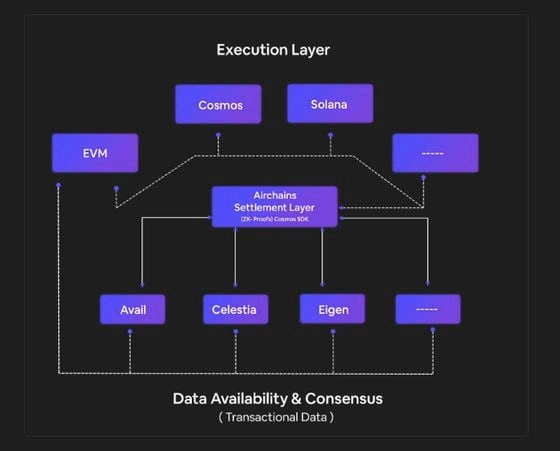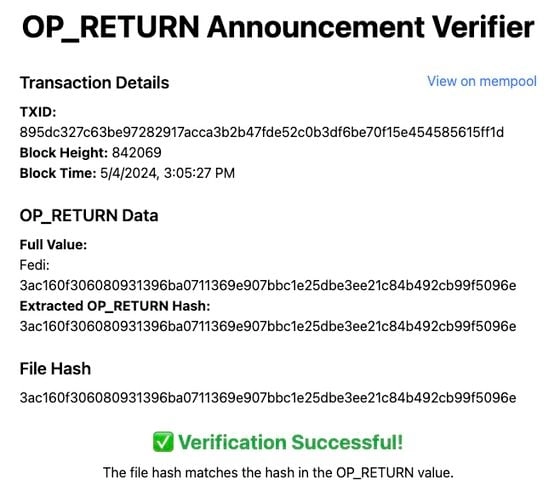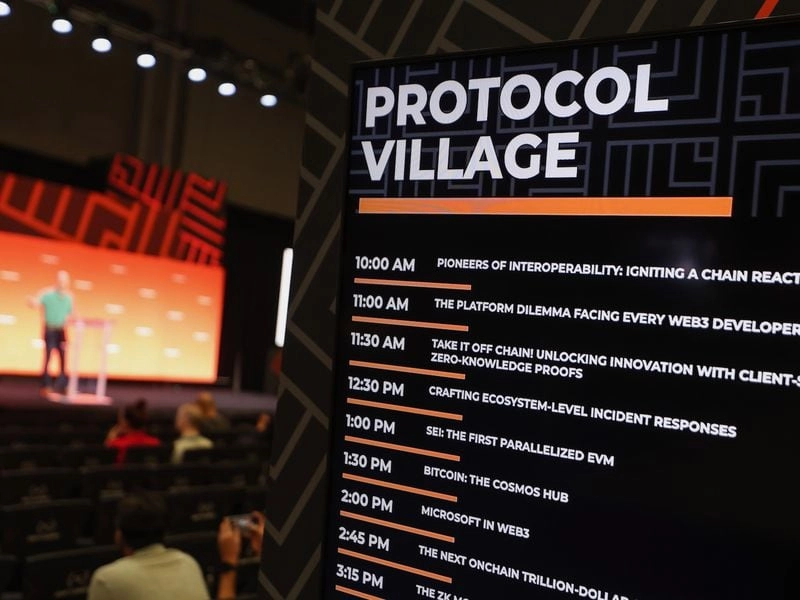Tuesday, Aug. 12
Manta Pacific Claims First Among L2s Adopting Multiple Data Availability Framework
Manta Pacific, the native layer 2 (L2) blockchain of Manta Network, said it's "the first L2 to adopt a Multiple Data Availability (MultiDA) framework." According to the team : "This MultiDA strategy will provide uninterrupted service and cost efficiency without impacting user experience or fees. By integrating with partners like Celestia, Nuffle Labs, EigenDA, 0G, Nubit, and Dill, Manta will enhance the security, resilience and uptime of its network. Manta has saved its users over $6 million since December 2023 with Celestia DA."
Internet Computer Integrates Threshold-Schnorr Signatures, Allowing Taproot Assets Connections
Internet Computer Protocol (ICP) , a blockchain based on threshold cryptography , state machine replication and a unique consensus algorithm, has integrated Threshold-Schnorr signatures , which enables builders like Omnity to handle Taproot assets and connect them with chains that use ed25519 signatures (such as Osmosis and Solana).
Aurora Labs Releases Bitcoin Light Client, Relayer, for Bridge to NEAR Protocol
Aurora Labs, a blockchain developer, has released a Bitcoin light client and relayer, bridging the Bitcoin network and NEAR protocol. According to the team: "This integration enables NEAR dapps to verify Bitcoin transactions and access the latest Bitcoin chain state, laying the groundwork for a future Bitcoin bridge. Additionally, Aurora introduced a chain signature service and plans the Satoshi Bridge for direct BTC deposits into NEAR, enabling new DeFi innovations. Aurora's CEO highlighted the potential of integrating Bitcoin with DeFi. The project will be continued by NEAR One."
Airchains Integration With Decentralized Sequencer Project Espresso Heads Toward Testnet
Airchains, a platform for launching customized modular blockchains built around the combination of zero-knowledge proofs and fully homomorphic encryption, has developed an integration with the Espresso sequencing layer, "to bring enhanced interoperability and decentralization to its ecosystem of chains spanning EVM, CosmWASM and SVM rollups," according to the team: "Airchains has replicated Espresso’s Ethereum L1 contracts in RUST, while maintaining the logic and functionality of the original solidity contracts. This is an ecosystem contribution that leverages RUST’s performance benefits. Airchains’ integration will be live on Espresso’s Cappuccino testnet soon and will migrate to Espresso mainnet when the network is ready."
 High-level view of Airchains framework (Airchains)
High-level view of Airchains framework (Airchains)
Metis Foundation Starts $4M Annual Incentive Program for App Development on L2
Metis Foundation unveiled a $4 million annual incentive program to foster app development on its Ethereum layer-2 solution, Metis, in partnership with Gitcoin and others. According to the team: "This initiative aims to build a vibrant ecosystem by empowering developers to create cutting-edge decentralized applications. Gitcoin, renowned for supporting open-source and decentralized projects, marks the first of many strategic collaborations. This partnership will accelerate innovation and drive adoption, enhancing the blockchain space. Further details on participation will be announced soon."
Protocol Village is a regular feature of The Protocol , our weekly newsletter exploring the tech behind crypto, one block at a time. Sign up here to get it in your inbox every Wednesday. Project teams can submit updates here . For previous versions of Protocol Village, please go here . Also please check out our weekly The Protocol podcast.
Monday, Aug. 11
Tap Protocol, from Trac Systems, Launches 'Bitcoin-Native Smart Contracts'
Tap Protocol, from Trac Systems, has launched what it says is the first Bitcoin-native smart contracts and DeFi tools directly on the Bitcoin layer 1, relying on the Ordinals metaprotocol. According to the team: "This breakthrough allows for smart contracts, swaps and liquidity pools without relying on layer-2 solutions. Tap integrates with systems like ICP to enable decentralized operations, enhancing Bitcoin’s utility and security for DeFi activities directly on its mainnet, making complex layer-2 setups unnecessary."
Superstate Integrates Chainlink Data Feed Into Tokenized Treasury Fund
Superstate and Chainlink announced on Monday the integration of Chainlink Data Feeds into Superstate's tokenized treasury fund, the Superstate Short Duration US Government Securities Fund (USTB). According to the team: "This integration enables Superstate to securely bring net asset value (NAV) data on-chain, enhancing the composability of the fund across the on-chain financial markets. Additionally, Superstate is integrating Chainlink Proof of Reserve in the coming months, to further enhance on-chain verification of AUM data." CoinDesk 20 asset: (LINK)
Privacy-Focused Aleph Zero Launches EVM-Compatible L2 Using Arbitrum Orbit
Aleph Zero, a privacy-focused blockchain project, has launched an EVM-compatible layer-2 network using Arbitrum Orbit to boost transaction speeds and efficiency. According to the team: "Built with Gelato, it offers near-instant finality and supports thousands of transactions per second. It utilizes a Substrate-based WASM L1 for data availability, secured by over 190 validators, enhancing both security and decentralization. This integration introduces advanced privacy features into the Ethereum ecosystem, catering to developers prioritizing speed and confidentiality." (ARB)
New 'Squads 'Policy Network,' Powered by Jito, to Let Enterprises Stipulate Whitelists, Spending Limits
Squads Labs, the developer team behind Squads Protocol, announced the development of the Squads Policy Network (SPN), which will allow enterprise users to add policies "to fit their organizational requirements, such as dynamic thresholds, program whitelists and granular spending limits." According to the team: "Squads Protocol smart accounts allow for setting multisig thresholds, permissions, time locks and spending limits, but they lack the granular transaction policies (e.g. whitelists) offered by centralized vendors. The SPN will be a distributed network that serves as a conditional signer for smart accounts, verifying transactions against user-generated policies. This enables granular policies for smart accounts in a trustless and decentralized way, powered by Jito (Re)staking."
Lending Protocol Euler v2 Completes Security Process Ahead of Launch, After 29 Code Audits
Euler Labs, the developer team behind the Ethereum-focused DeFi lending project Euler, announced that its upcoming "v2" has completed an extensive security process, a crucial step in the move toward launch. According to the team, Euler v2 has "undergone 29 code audits by 12 independent firms, showcasing their commitment to security post-exploit. By undergoing such an extensive process, Euler sets a new standard for DeFi protocols and security expectations across the industry. The rigorous audits ensure Euler v2's reliability before launch, establishing confidence in the security that its modularity design offers for the creation of permissioned and permissionless markets for retail and institutional users."
Drop Launches as Cross-Chain Liquid Staking Protocol, Is Inaugural Member of Lido Alliance
Drop, a cross-chain liquid staking protocol for the Interchain, has officially launched as one of the inaugural members of the Lido Alliance. According to the team: "Implemented as an Integrated Application on Neutron and spearheaded by former Lido DAO contributors and P2P, Drop aims to strengthen the economic viability of sovereign blockchain economies by transforming unproductive staked assets into flowing streams of opportunity. Drop allows users to automatically compound their staking rewards, earn additional DeFi yield, exit their staking position at any time with no unstaking period."
Stacks Foundation Confirms Nakamoto Upgrade Activation on Track for End of August
Stacks Foundation, supporting the Bitcoin scaling-layer project Stacks, confirmed Aug. 28 as the new target date to start the activation sequence for its months-delayed " Nakamoto upgrade ," which aims to bring significant improvements to both security and speed, with increased transaction throughput, " 100% Bitcoin finality " and mitigation of Bitcoin miner extractable value (MEV). The project's planned non-custodial, programmable 1:1 Bitcoin-backed asset, sBTC, will be "ready for mainnet release as soon as four weeks after the Nakamoto hard fork," according to a tweet thread . Stacks, which officially launched its mainnet in 2021, started the two-step rollout of the Nakamoto upgrade in April, around the time of Bitcoin's most-recent halving . But then on April 30, the foundation announced that eight more weeks of development time were needed before activation, attributing the delay to "the benefit of more information and practical experience with aspects of the new network."
Optimism Pushes for 'Interoperability' Between Affiliated Blockchains
Optimism, a layer-2 blockchain ecosystem atop Ethereum that has been successful in attracting new projects to use its technology – notably including Coinbase's Base – is now looking to more intimately connect the affiliated networks. The ecosystem, built with the aim of allowing users to transact for cheaper on top of Ethereum, laid out its roadmap on Monday for what it's describing as a native interoperability solution, addressing issues of fragmentation between the various Optimism chains. (OP)
Fedi, 'Superapp' for Bitcoin-Focused Fedimint Protocol, Launches – With OP_RETURN Reveal
Fedi, describing itself as a "community superapp" or a "frontend application" atop Fedimint, a protocol for community custody of bitcoin, launched on Aug. 6, according to a blog post. The project simultaneously revealed that on May 4 it included a cryptographic hash of a PDF memo from Fedi pledging to transition its software to fully open-source its software by January 2026. This blog post explains that the cryptographic hash can be verified by dropping the file into the verifier along with the transaction ID.
 Screenshot from OP_RETURN announcement verifier of Fedi's open-source pledge, written in a PDF file and then cryptographically hashed (CoinDesk/Fedi/announcement-verifier.replit.app)
Screenshot from OP_RETURN announcement verifier of Fedi's open-source pledge, written in a PDF file and then cryptographically hashed (CoinDesk/Fedi/announcement-verifier.replit.app)
Friday, Aug. 9
Greyscale AI, Design Partner for Casper Labs' AI Governance Solution, Goes Live on Casper Mainnet
Greyscale AI, a project for food inspection, now using Casper Labs’ AI governance solution, Prove AI, said it has gone live on the enterprise-focused Casper mainnet, "recording the first batch of AI production data." According to the team: "20K lots were updated to the Casper Mainnet, with 280K more expected to be deployed in the coming weeks and a continual data pipeline after. This marks Prove AI’s first official footprint on the Casper network – a significant increase in Casper mainnet’s daily transactions – and previews blockchain’s importance to promote greater trust for AI adoption and responsible use." (NOTE: Casper Labs is working with several design partners as it develops the Prove AI governance solution alongside IBM.)
Thursday, Aug. 8
Cubist, Blockchain Key Manager, Adds Comprehensive Support for Bitcoin Transaction Signing
Cubist, led by co-founder and Carnegie Mellon University engineering Assistant Professor Riad Wahby, announced that its key management platform, CubeSigner, has released a full-featured Bitcoin API. According to the team: "With this release, CubeSigner now offers comprehensive key management support for Bitcoin, including policy-protected SegWit and Taproot keys and a native API for Partially Signed Bitcoin Transaction (PSBT) signing. The release makes CubeSigner a one-stop shop for Bitcoin key management and signing: key generation, safety policies, authentication, access control and a full-featured transaction API."
Stork Network Launches 'Open Data Market' as Rival to Incumbent Price Oracles
Stork Network has launched the Open Data Market, "a new way of provisioning data and pricing information to decentralized protocols that is faster, cheaper, and more customizable than incumbent pricing oracle solutions," according to the team: "Stork supports more than 2,000 assets and counting, and launched this product in direct response to consumer demand. The Open Data Market enables data publishers, data consumers, and composite oracle services to consume or publish data in a marketplace built to enable anyone, anywhere to access and/or build on-chain."
Vessel Finance, Evolving Into 'Layer3 Network for DeFi,' Secures $10M in Seed Funding
Vessel Finance, a zero-knowledge(ZK) powered decentralized exchange that says it's "evolving into a comprehensive layer-3 network for DeFi, has raised $10 million in a seed round," according to the team: "The round included key investments from Sequoia, Scroll, Avalanche Foundation, Algorand Foundation, IMO Ventures, Folius Ventures and @Incuba_Alpha. The funding is strategically planned for: building and optimizing ZK Infrastructures, expanding strategic collaborations and a reward program.
Sei, Parallelized EVM Blockchain, to Integrate Modular DA Layer Covalent's GoldRush.dev Stack
Covalent, a modular data infrastructure layer, announced a strategic collaboration with Sei, a parallelized EVM blockchain. According to the team: "By integrating Covalent's GoldRush.dev stack with Sei's high-speed environment, this collaboration empowers more blockchain innovations while providing an efficient and seamless developer experience. Sei will become part of Covalent's diverse ecosystem spanning over 230 blockchains. Additionally, this further strengthens Covalent's commitment to creating a robust data infrastructure and making Long-Term Data Availability more accessible." (SEI)
NEAR Pushes 'Signatures' on Mainnet, in Growing Trend of Chain Abstraction
NEAR Foundation, the non-profit behind the NEAR blockchain, announced on Thursday that a new feature designed to make it easier to seamlessly transact between networks is live on mainnet – adding to a growing trend of projects working on a design concept known as "chain abstraction." The feature, Chain Signatures, was introduced in testnet in March , and allows users with a NEAR account to sign transactions on blockchains it supports, without the need for cross-chain bridges. The move is supposed to eliminate some of the steps when it comes to transacting on different chains, making it faster and easier to use. (NEAR)
Coinbase-Backed Vega Gets Into Prediction-Market Race, Chasing Polymarket
Coinbase Ventures-backed Vega network is joining the competitive fray of prediction markets with its own betting-focused upgrade. Vega, a blockchain and decentralized exchange (DEX) that uses the Cosmos network infrastructure, is one of a number of crypto platforms focused on perpetual futures – a tool for speculating on future asset prices. Vega's new update expands its DEX app to accommodate prediction markets, allowing users to bet on the outcomes of future events just as they can currently bet on future token prices.
BasedVC, Decentralized Proprietary Investment Platform, Raises $2M in Seed Round
BasedVC , describing itself as a "token-powered, decentralized proprietary investment platform," has raised $2 million in a seed round as official investment partners to Neo Tokyo, Kongz Capital and more, according to the team: "In the past year, BasedVC saw over $65 million in platform revenue, deploying investments into 50+ cryptocurrency projects. The firm raised $2 million at a $15 million post-money valuation with participation from angel investors like Mario Nawfal, Crypto Banter, Ashcrypto and Kmanu. As a decentralized investment portal, we let communities and retail users join pre-seed and private rounds, avoiding high risks of public rounds and raising funds from strategic communities like Neo Tokyo."
Nillion, Ritual Team Up to Develop 'Decentralized Blind AI Inference Technology'
Nillion , a blind computation network, announced a partnership with Ritual, a decentralized AI infrastructure network, "to develop decentralized blind AI inference technology that democratizes access to AI." According to the team: "This collaboration enables traditional and Web3 applications to use Ritual for trustless, verifiable inference of sensitive data through Nillion's blind computation technology, which ensures data privacy throughout the computation process. The partnership facilitates secure AI model sharing and promises innovations in healthcare, IoT, chatbot systems, and more."
Validation Cloud's Node API to Support Stellar Horizon, Offering Access to Full Archive Nodes
Validation Cloud, a Web3 infrastructure company, announced support for Stellar Horizon, an HTTP API to data on the Stellar network. According to a press release: "Horizon allows applications such as wallets, decentralized exchanges (DEXs) and asset issuers to more easily consume data produced by the Stellar network.... Validation Cloud’s archive nodes for Stellar maintain a complete history of the network, allowing developers to query historical ledger data, transaction details, and account states. This is crucial for applications requiring deep historical analysis of Stellar network operations." (XLM)
Non-EVM Blockchain MultiversX Launches Snap on MetaMask, Adding 2FA
MultiversX, a non-EVM blockchain (it executes smart contracts that can be compiled to WASM bytecode), has launched the MultiversX Snap on MetaMask, providing users access to its ecosystem with added security via 2FA, according to the team: "MetaMask Snaps are third-party audited add-ons for extended wallet functionality. This integration embeds 2FA logic into the sharded protocol, making it compatible with all ecosystem apps and wallets, now accessible to MetaMask users. MultiversX's on-chain 2FA, known as Guardians, offers enhanced security without complicating user experience, leveraging tools like Google Authenticator."
Edited by Bradley Keoun.




